- Home
- David Lubar
Emperor of the Universe Page 6
Emperor of the Universe Read online
Page 6
And now, back to Nicholas, who has just emitted several heart-wrenching sighs and sobs of rising depth and deepening sorrow.
WAR AND PEACE
“What’s wrong?” Henrietta asked.
“I killed a whole group of…” Nicholas groped to find the right term for his victims.
“Loathsome insects?” Henrietta suggested.
Torturers? Jeef said.
“No. I mean, yes. They were loathsome insects and torturers. And I guess they made a show about cutting things up. But they were also intelligent,” Nicholas said.
“And what difference does that make?” Henrietta asked.
“Well, you have to draw a line somewhere,” Nicholas said. “I mean, I wouldn’t kill a person. And I wouldn’t kill an alien who looked like a person. So, really, the only difference is that I killed aliens that didn’t look like people. That pretty much seems like a bad thing to do.”
“Not from where I was strapped,” Henrietta said. “And I suggest that you try to get used to the idea. It sounds like this is your new profession, and there’s a lot of demand for your skills. It also seems like the universe is not a very peaceful place.”
“I just want to go home,” Nicholas said.
Henrietta skittered over to a table and tapped one leg with her forepaw. “Try chewing something. That always makes me feel better.”
Before Nicholas could respond, the door opened. “I brought you food,” Clave said. “I had to go back to the ship. I forgot all about it.”
Bracing himself for something hideous, Nicholas looked at the platter Clave was carrying. There appeared to be a salami sandwich, a glass of soda, and a small bowl of gerbil chow.
“I had my ship teleport it from your home planet before we left the region,” Clave said. “The computer identified it as a popular item. There’s lots more on board, in the stasis locker.”
“Thanks,” Nicholas said. “I’m starving.”
“I’d be starving all the time if I lived on your planet.” Clave pointed at the sandwich. “You Earthlings eat some hideous things. This smells like it stopped being edible about five years ago. Though I like these snack nuggets.”
He popped a pellet in his mouth and crunched it.
“So you just steal stuff from planets?” Nicholas asked.
“Sure,” Clave said. “Especially barbarian strongholds. It’s fun to imagine what they think when things vanish. Hey! Where’s my sandwich? I know several people who collect socks. But they only take one at a time. It’s quite amusing.”
“Doesn’t it bother you that you’re stealing?” Nicholas asked.
“Would you rather I took away the food?”
“I guess not,” Nicholas said. “Can you teleport me home?” He was more than ready to end this adventure, especially if people expected him to lead some sort of global war.
“Not at this distance,” Clave said. “Whatever parts of you arrived there, if they even made it, would probably look a lot like your reddish blob of a friend.”
Hey! Jeef said. I’m right here.
“Perpetually,” Henrietta muttered.
At least I’m not ruining the furniture.
Nicholas ignored his companions. But he did shudder, slightly, at the image of arriving back home looking like ground beef. “How far are we from Earth?” he asked.
“Far enough that a number would be meaningless to you,” Clave said. “The only measure of any significance is that we’re seven jump nodes away. That’s the measure of all things, when it comes to interplanetary travel. For now, just enjoy your hideous meal.”
“It’s not silently screaming about being eaten, is it?” Nicholas asked, unaware that self-awareness was produced by the GollyGosh!, and not by the Ubiquitous Matrix.
“Of course not,” Clave said.
“Okay, thanks.”
“Oh, by the way,” Clave said, “we’re up to almost four million views.”
“Views of what?” Nicholas asked.
“My sfumble.”
“Your what?”
“Oh, dear. I keep forgetting. You really did live a life of deprivation. Here, I’ll show you. It’s awesome.” He held his hand out, palm up, and tapped a symbol tattooed on his right pinky against the symbol on his palm. An image appeared above his hand. It was some sort of social-media page. At the top, it read CrazyClave4632915. An audio loop, in Clave’s voice, stated: “Look who I ran into. It’s Nicholas the Assassin! He’s surprisingly friendly for a mass murderer. And, who’d have thought it, he’s afraid of pirates! Arg!”
Beneath the heading Nicholas saw the panoramic scene Clave had snapped on the Craborzi ship, with Henrietta peeking out of Nicholas’s pocket, and Jeef thrust forward, along with a caption written in pulsing letters: “On our way to Menmar.” Beneath that was the view count, which was spinning steadily higher.
“I redid the audio and added some text,” Clave said. “I think it’s perfect now.” Timed with the Arg in the audio, Clave’s face popped up, superimposed on the video, wearing a pirate hat and an eye patch.
“I look small,” Henrietta said.
I look fat, Jeef said.
“According to your package, you’re ten percent fat,” Henrietta said.
I feel more like twenty.
“Who, exactly, is seeing this?” Nicholas asked.
“Pretty much everyone,” Clave said. “I have a large following. I’m Crazy Clave, the Kooky Courier. I’m not as large as Frenzied Fans of Xroxlotl, or Cooking Across the Universe with Fleexbeezle. Not yet. Still, I’m very popular.” He flashed Nicholas a huge grin. “I’m just doing this courier gig until my sfumbling career takes off and I pick up some sponsors. One or two billion fans should do it. They say the first hundred million is the hardest, and I’m already halfway toward ten percent of that. Roughly.”
Nicholas pointed at the caption. “So pretty much anyone who sees this knows we were heading for Menmar?”
“Yes. If they read the caption,” Clave said. “Sfumbles use a Matrix font everyone can understand.”
“Including those police?” Nicholas asked. “You know, the ones who want to arrest me.”
Clave’s grin faded and he reflexively glanced in the direction of the sky. “Don’t worry, they aren’t allowed to arrest anybody on a planet. They only have authority in space. You’re safe here.”
“We’re not on a planet. We’re in it,” Nicholas said. “That might make a difference.”
“Probably not. But maybe we should move up your strategy meeting with the president.” Clave dashed out.
“We should get off this planet immediately,” Henrietta said as the door closed.
“How?” Nicholas asked.
“We could take Clave’s ship,” she said.
“Based on recent experiences, I suspect that would not turn out well,” Nicholas said. “Let me think about it.”
Having nothing much else to do, and being perfectly capable of thinking and chewing at the same time, Nicholas picked up the sandwich. He waited a moment, and listened for the slightest whimper, in case it was going to try to talk him out of consuming it. The sandwich remained mute, and temptingly aromatic. Nicholas took a bite. It tasted fine, and didn’t scream. He was pleased to discover that the soda, which turned out to be root beer, was still nice and cold.
He put the bowl of gerbil chow on the floor for Henrietta, who dug right in.
“How about you?” he asked Jeef. “Hungry?”
No. I don’t seem to be, Jeef said. I guess that’s a good thing. Slothfulness casteth into a deep sleep; and an idle soul shall suffer hunger.
“If you say so.” Nicholas chewed on his sandwich, and on all the new ideas that he’d been flooded with. Henrietta was right. They needed to get away from Menmar. But he had no idea how to operate the ship.
“Yum. Good salami,” he said.
That’s not beef, is it? Jeef asked.
Nicholas froze in midchew. A wave of guilt washed over him as he realized what Jeef’s que
stion meant. “You figured it out?”
Yes, I did. Cows aren’t stupid. We aren’t slow. We’re just as smart as horses, and a lot smarter than chickens. Or poopy rats.
“I’m not a rat,” Henrietta said.
Jeef ignored her and got back to the main question. I heard an old bull talk about beef once, but I never really understood what he meant. Not until now. Is that beef you’re eating?
Nicholas, who had finally managed to empty his mouth, searched his mind for anything he knew about cold cuts, which was basically almost nothing. “I’m pretty sure it’s pork. You okay with that?” He hoped that was at least partially true.
Yes, I am. Pigs are stuck-up. They act like they’re better than the rest of us. And their poop stinks.
“You talk about poop a lot,” Henrietta said.
There’s not much else to talk about on a farm.
“Hey.” Nicholas tapped Jeef on the top of her wrapper and waved the sandwich. “You can see this?”
Of course.
“But how?” Nicholas remembered that Jeef had seen her reflection back on the Craborzi ship. Though, at the time, there was too much going on for him to really pay attention to her and realize what that meant. He wondered whether, maybe, he wasn’t as smart as a cow or horse. Though he hoped he rose above the level of a chicken.
I’ve always been able to see, Jeef said.
Henrietta ran up Nicholas’s leg and hopped onto the table. She skittered over to Jeef and read the small print on the side of his label. “Hmmm. Contains beef and beef byproducts.”
“I wonder what those are?” Nicholas said.
“If she can see, it has to be eyeballs,” Henrietta said. “They’re in there. Bits of ground eyeballs. Obviously, there’s lots of tongue in the mix. Maybe too much. Ear parts, too, I guess, since she can hear.”
I don’t like what I’m hearing, now, Jeef said. I knew I’d been wrapped up. I didn’t know I’d been ground into pieces.
“Oh…” Nicholas thought about all the hamburgers he’d eaten. And the hot dogs and sausages. And the spicy beef sticks. He’d always thought they were just made of steak, and not lots of parts. He regarded his half-eaten salami sandwich. It was tasty. And, the way things were going, it could very well be his last meal as a free person. He shrugged and took another bite.
“I’m sorry about you getting ground up,” he said, between mouthfuls.
At least I’m still me, she said. This is my comfort in my affliction.
“Um, okay.” Nicholas guessed that was a good thing. It definitely seemed like a positive way to look at a bad situation. “I admire your attitude.” He wasn’t sure he’d cope that well with being ground up.
After he ate, he spent a few interesting minutes figuring out how Menmarian bathrooms worked. And a few more minutes after that mopping up the floor with what he hoped was a towel, and not another life-form.
By then, Clave had returned. “They’re ready for you. All the military leaders have assembled. We’re eager to crush our enemies and end this war. You will lead us to greatness.”
“I’ll give it a shot, but don’t get your hopes up,” Nicholas said. He figured his ideas would be so useless, the Menmarians would realize they’d made a mistake and would send him home, where he could get to work spending all his gold. He lifted Henrietta, put her on his shoulder, and braced himself for another trip through the depths of a chimichanga.
What about me? Jeef called.
“Just chill out,” Nicholas said.
Chill! Auggghhh! Bad memories! So cold. So dark.
“Sorry, poor word choice,” Nicholas said. “Just relax. We’ll be back.”
No you won’t, Jeef said. You’re going to abandon me.
This was true, of course, in some universes, and false in others.
A BIT ABOUT GETTING FROM HERE TO THERE
There are many methods to get an object from one place to another. Let’s suppose you have a coin on the upper right corner of a piece of paper, and want to get it to the lower right corner. You can slide it across. That’s basic surface travel, which is essentially the same whether you’re walking, riding in a car, or sailing in a boat. Or you can pick up the coin and plop it down in its new location. That also takes you through all the points in between, though you’ve left the surface and chosen a path made of different points. In each case, a certain amount of mass was moved a certain distance, requiring a certain amount of energy.
You can also bend the paper so the lower right corner meets the upper right corner. In essence, you’ve folded the universe of the paper. The object reaches its destination without physically moving through space. A quibbler or stickler might point out the error that the paper is two-dimensional and the coin is three-dimensional, and a true hyperjump would involve a two-dimensional object traveling through three-dimensional space, or a three-dimensional object traveling through four- (or greater) dimensional space. While this is technically true, quibblers and nitpickers serve no purpose other than to suck the fun out of everything, so we’ll ignore them. The main thing is that the example gives you the basic idea that you can shorten or eliminate any distance between objects by folding the space they occupy, or by taking advantage of existing folds.
Let’s take a closer look at hyperjumps, which is one name for moving from somewhere to elsewhere without using up any time or very much energy, by taking advantage of the way space is folded upon itself. Jump nodes occur throughout the universe. Most planets, as well as the more massive moons, have at least one. As do most stars, though only an idiot would try to travel to a sizzling ball of hydrogen. Each node connects to at least two others. Some connect to four or eight or sixteen others, or even to far higher powers of two. (The universe is a bit rigid when it comes to some things, such as powers of two, and a preference for vanilla over strawberry ice cream anyplace where both those flavors exist.) Since each leap from node to node consumes one j-cube, the cost of a hyperjump depends on how many nodes are required to reach the destination.
All of these methods of travel involve an object starting at one place and ending up at another. Whatever the distance, the object remains intact. The other, completely different method of getting something somewhere is to break down the object into its component molecules. Those molecules are transmitted through space by rather complicated devices and reassembled at the other end. That method would be teleportation, which Nicholas experienced when he was abducted by the Craborzi. It works over short distances. Most civilized worlds cloaked themselves in teleportation shields, to prevent their enemies (which most civilizations have) from teleporting the residents to a receiver set somewhere horrible, like the cold dead vacuum of outer space, or a middle-school cafeteria.
What the universe lacked and craved was a means of teleportation that worked over immense distances, like hyperjumps, but which wasn’t restricted to specific isolated destinations in outer space.
Eventually, that was discovered. And it changed everything, in a huge and stunningly unimportant way. We’ll look at that technology later. Right now, it’s time to go to war.
DIPLOMACY
After being introduced to President Nixon (one aspect of a nearly infinite universe is that there will be nearly infinite coincidences), along with an assortment of other leaders and advisors, Nicholas found himself on a seat that seemed to be floating in air. A small clear screen hovered in front of it, like a tabletop. He was glad he’d brought Henrietta. He had a feeling her advice might come in handy.
“We are hoping to deliver a crushing blow to our mortal enemies, the Zefinorans,” President Nixon said.
“Destroy them!” Vice President Gluteus Sofacushion yelled. (Another aspect of a nearly infinite universe … oh, never mind…)
“What did the Zefinorans do to you?” Nicholas asked.
“They want to enslave us,” the president said.
“That’s terrible.” Nicholas turned his head to Henrietta and whispered, “Maybe it would be good to help them. Slavery i
s horrible.”
“Ask them why this is happening,” she whispered back.
“Why do they want to enslave you?” Nicholas asked.
“They’re angry about a minor incident from the past,” the vice president said.
“What incident?” Nicholas asked.
“Nothing much, really,” President Nixon said. “It was a trifling matter that happened very long ago.”
“It would help to know the details,” Nicholas said, drawing on his experience with peer counseling, though he was the one usually getting counseled. “It’s always good to see things from the other side.”
“We enslaved them for a while,” Clave said.
“How long is a while?” Nicholas asked.
“Just a brief little period of time,” President Nixon said. “An eyeblink compared to the age of the universe.”
“How long of an eyeblink?” Nicholas asked.
“Five thousand years,” the president said.
“We needed a lot of labor to build our glorious cities,” the vice president said.
“Like the one that’s in rubble above us?” Nicholas asked.
“Yes, that one,” Clave said. “It used to be much nicer.”
“So,” President Nixon said, “what’s your plan? How do we obliterate our enemy once and for all and restore peace and prosperity to our land?”
Nicholas thought about his school back home. A pang rippled through him as he wondered whether he’d ever see it again. As much as middle school could be a horror show of social torture, cliques, bullies, endless homework, ridiculous rules, irregular verbs, sketchy cafeteria meat, unbalanced equations, and confusing expectations, it was still a familiar routine and an established part of his life. He thought about how the teachers would make any kids who were fighting sit down together and work things out, and about the great peacemakers he’d learned about in social studies, like Martin Luther King Jr., Malala Yousafzai, and Mohandas Gandhi.

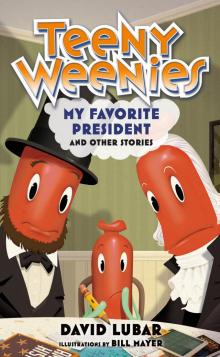 Teeny Weenies: My Favorite President
Teeny Weenies: My Favorite President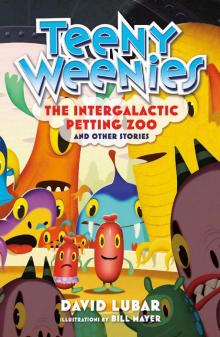 Teeny Weenies: The Intergalactic Petting Zoo
Teeny Weenies: The Intergalactic Petting Zoo Teeny Weenies: The Eighth Octopus
Teeny Weenies: The Eighth Octopus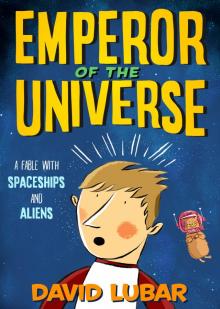 Emperor of the Universe
Emperor of the Universe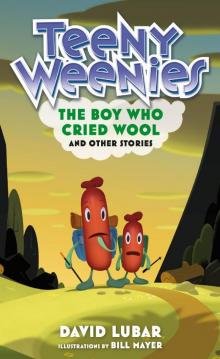 Teeny Weenies: The Boy Who Cried Wool
Teeny Weenies: The Boy Who Cried Wool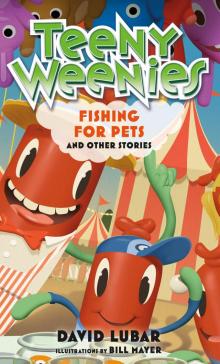 Teeny Weenies: Fishing for Pets
Teeny Weenies: Fishing for Pets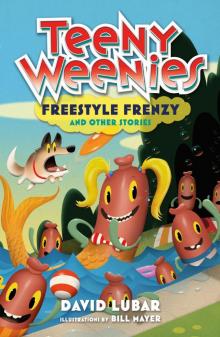 Teeny Weenies: Freestyle Frenzy
Teeny Weenies: Freestyle Frenzy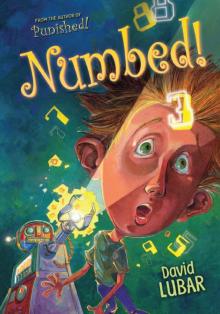 Numbed!
Numbed!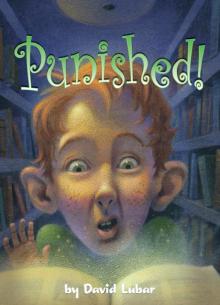 Punished!
Punished!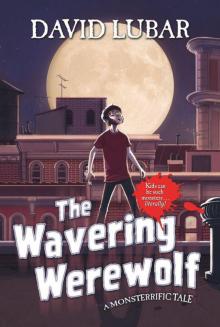 The Wavering Werewolf: A Monsterrific Tale (Monsterrific Tales)
The Wavering Werewolf: A Monsterrific Tale (Monsterrific Tales)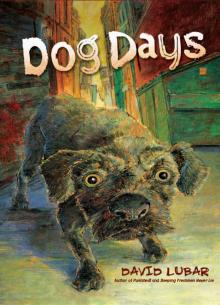 Dog Days
Dog Days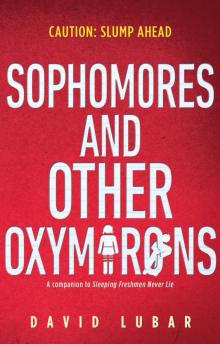 Sophomores and Other Oxymorons
Sophomores and Other Oxymorons The Psychozone
The Psychozone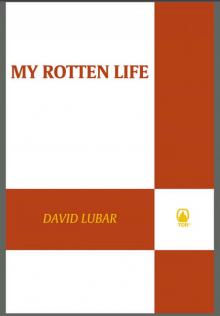 My Rotten Life
My Rotten Life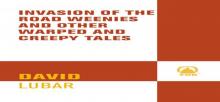 Invasion of the Road Weenies
Invasion of the Road Weenies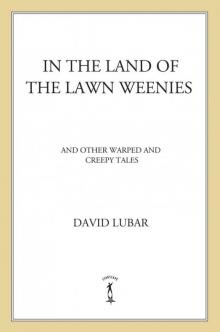 In the Land of the Lawn Weenies
In the Land of the Lawn Weenies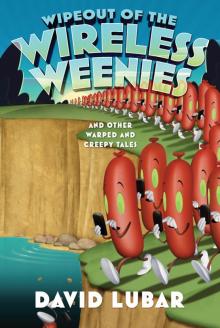 Wipeout of the Wireless Weenies
Wipeout of the Wireless Weenies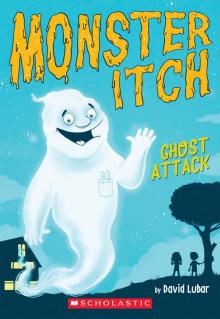 Ghost Attack
Ghost Attack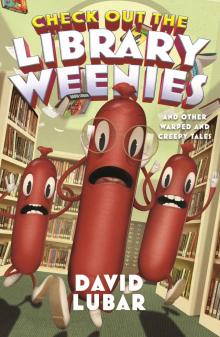 Check Out the Library Weenies
Check Out the Library Weenies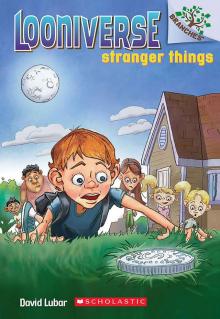 Looniverse #1: Stranger Things (A Branches Book)
Looniverse #1: Stranger Things (A Branches Book)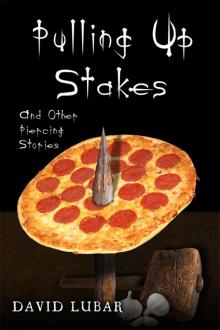 Pulling up Stakes and Other Piercing Stories
Pulling up Stakes and Other Piercing Stories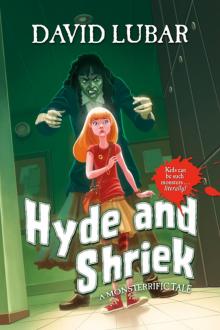 Hyde and Shriek
Hyde and Shriek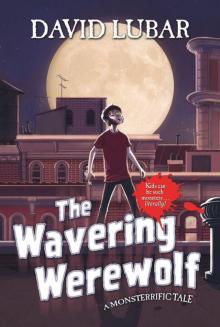 The Wavering Werewolf
The Wavering Werewolf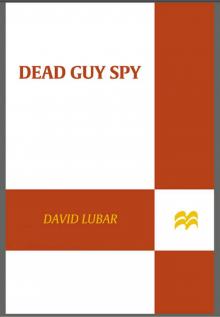 Dead Guy Spy
Dead Guy Spy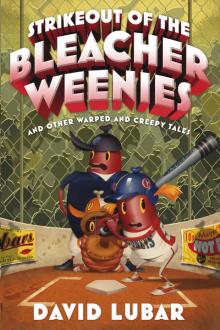 Strikeout of the Bleacher Weenies
Strikeout of the Bleacher Weenies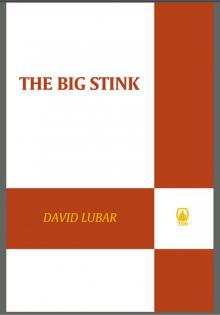 The Big Stink
The Big Stink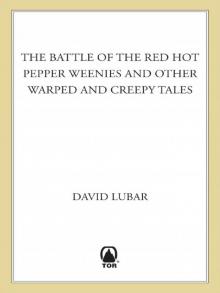 The Battle of the Red Hot Pepper Weenies
The Battle of the Red Hot Pepper Weenies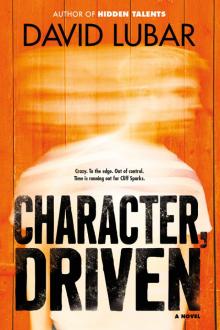 Character, Driven
Character, Driven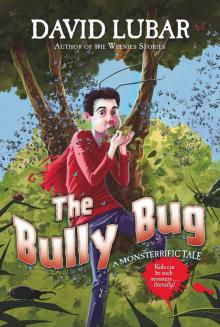 The Bully Bug
The Bully Bug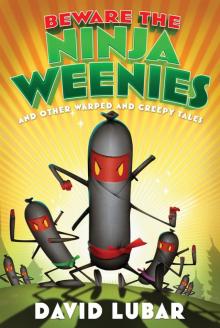 Beware the Ninja Weenies
Beware the Ninja Weenies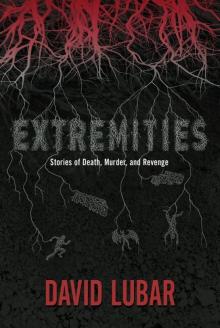 Extremities: Stories of Death, Murder, and Revenge
Extremities: Stories of Death, Murder, and Revenge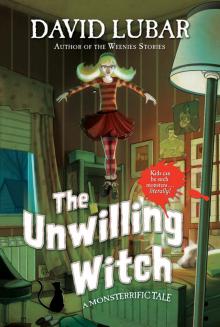 The Unwilling Witch
The Unwilling Witch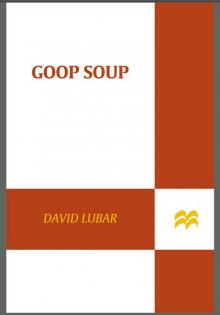 Goop Soup
Goop Soup Lay-ups and Long Shots
Lay-ups and Long Shots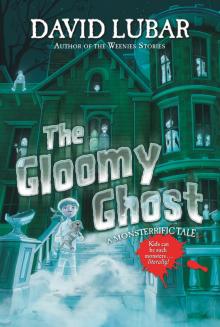 The Gloomy Ghost
The Gloomy Ghost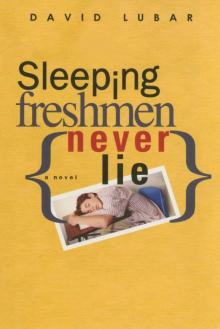 Sleeping Freshmen Never Lie
Sleeping Freshmen Never Lie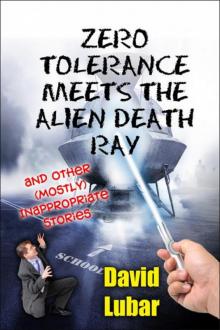 Zero Tolerance Meets the Alien Death Ray and Other (Mostly) Inappropriate Stories
Zero Tolerance Meets the Alien Death Ray and Other (Mostly) Inappropriate Stories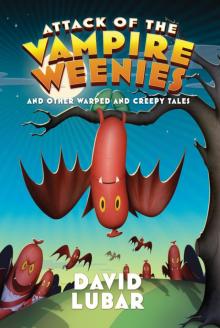 Attack of the Vampire Weenies
Attack of the Vampire Weenies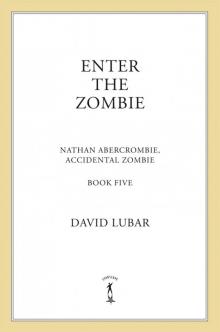 Enter the Zombie
Enter the Zombie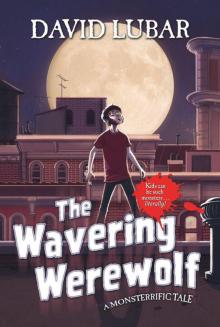 The Wavering Werewolf_A Monsterrific Tale
The Wavering Werewolf_A Monsterrific Tale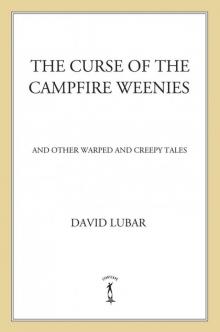 The Curse of the Campfire Weenies
The Curse of the Campfire Weenies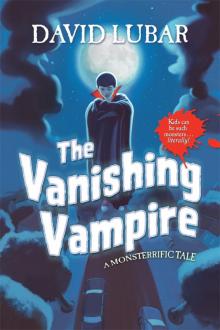 The Vanishing Vampire
The Vanishing Vampire